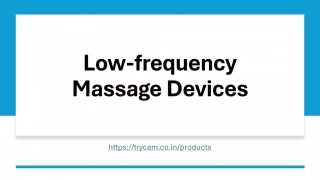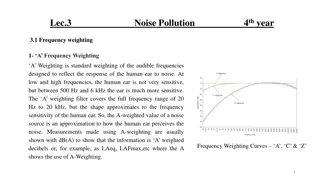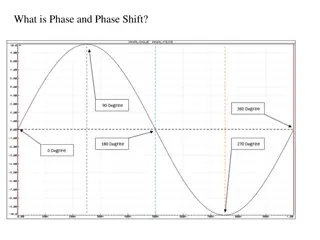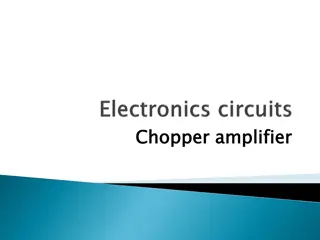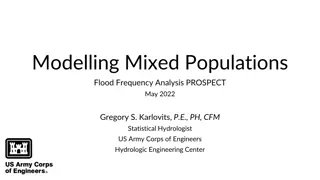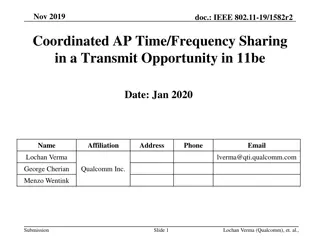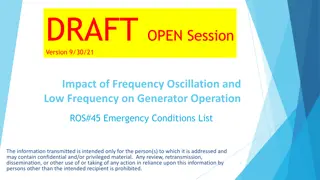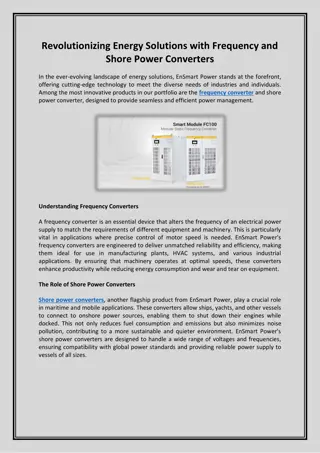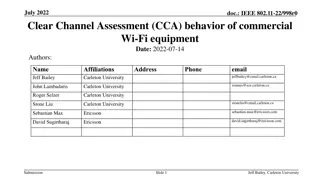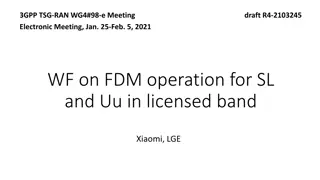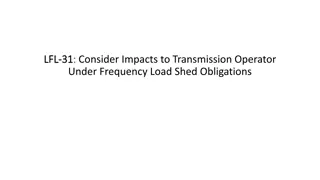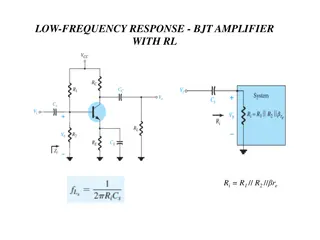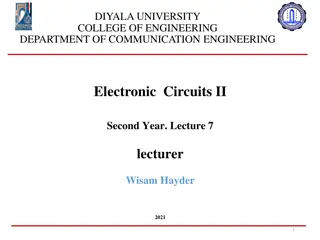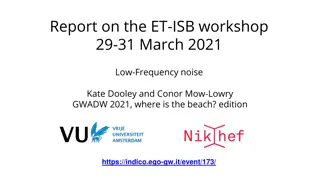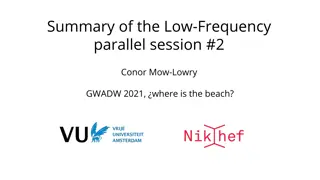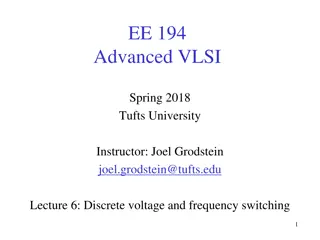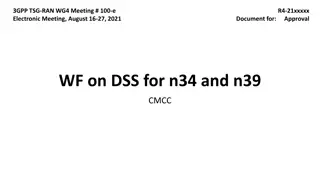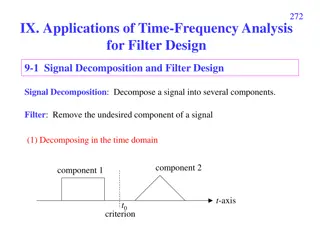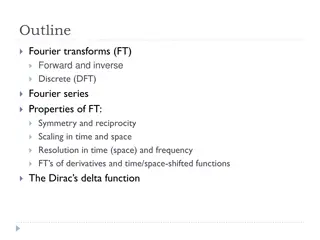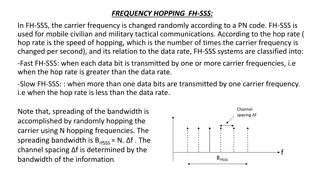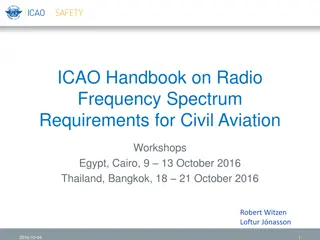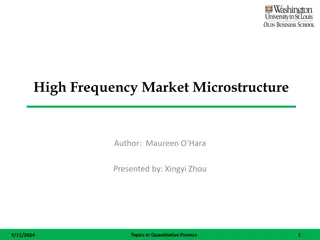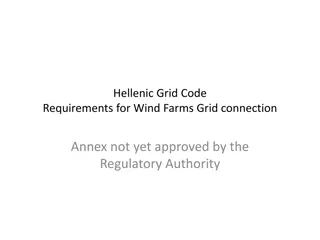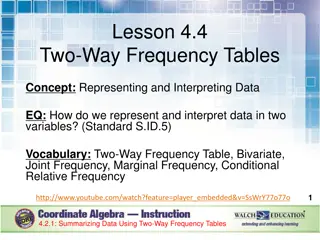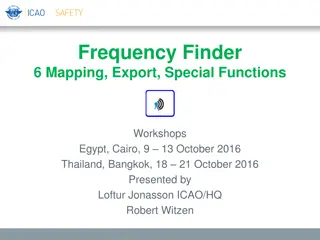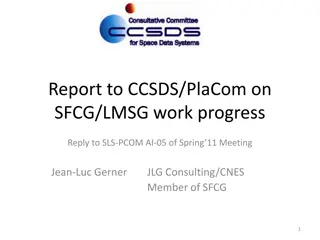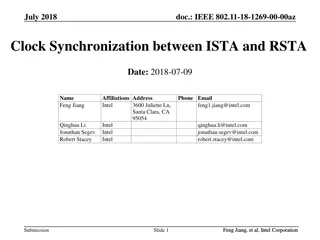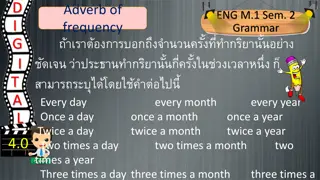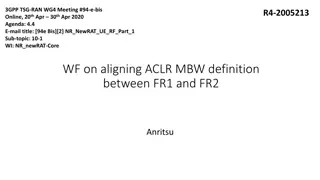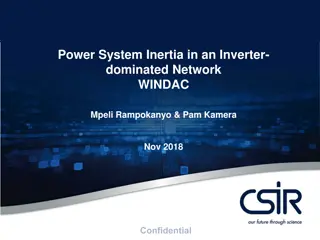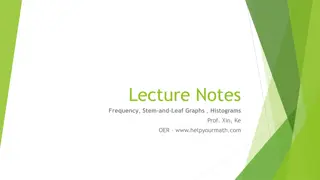Low-frequency Massage Devices
Low-frequency Massage Devices\nUnwind and rejuvenate with Trycam's cutting-edge low-frequency massage devices, designed to bring the benefits of professional massages to the comfort of your own space. Our innovative technology delivers a soothing and effective massage experience, promoting relaxatio
3 views • 5 slides
Understanding Frequency Weighting in Noise Pollution Measurement
Frequency weighting is essential in noise pollution measurement to reflect how the human ear perceives noise. The A, C, and Z weightings are commonly used to represent different frequency responses. A-weighting covers the audible frequencies where the human ear is most sensitive, while C-weighting i
2 views • 7 slides
Racking Inspection Frequency & Cemetery Inspections
With so much health and safety law dependent on inspections, defining it legally can literally be a matter of life and death.\n\nAn enormous part of warehouse safety is racking inspection frequency, which HSE spells out in HSG76 \u2014 Warehousing and Storage: A Guide to Health and Safety.\n\n\/\/se
4 views • 3 slides
Adverbs and Expressions of Frequency in English
Reviewing adverbs and expressions of frequency in English language for oral and written text production. Focus on types of relationships and grammar. Activities to analyze sentences and frequency indicators. Overview of common adverbs and expressions used to express regularity.
4 views • 20 slides
Load Frequency Control in Power Systems
Electric power systems require Load Frequency Control (LFC) to maintain a uniform frequency, distribute load among generators, and manage tie-line interchange schedules. LFC detects frequency changes, generates real power commands to adjust torque, and ensures stability within specified limits. Reas
8 views • 38 slides
Understanding RC Phase Shift Oscillators
Dive into the world of RC phase shift oscillators, exploring the concepts of phase and phase shift in electronic circuits. Learn how cascading RC networks can achieve specific phase shifts, the role of impedance, and the practical applications of RC feedback networks in oscillator circuits. Discover
1 views • 18 slides
Understanding Chopper Amplifiers: Applications and Benefits
A chopper amplifier is an electronic circuit methodology used to minimize signals, DC offsets, noise, and low-frequency circuit conditions in operational amplifiers. Chopper stabilized amplifiers employ modulation to reduce noise, while chopper amplifiers find applications in battery chargers, elect
0 views • 7 slides
Understanding Mixed Populations in Flood Frequency Analysis
In this presentation by Gregory S. Karlovits, P.E., PH, CFM, a statistical hydrologist from the US Army Corps of Engineers, the focus is on modelling mixed populations in flood frequency analysis. The key topics include revisiting the IID assumption, identifying mixed populations, and building model
0 views • 38 slides
Coordinated AP Time/Frequency Sharing in IEEE 802.11be
The document discusses Coordinated AP (CAP) Time/Frequency Sharing in Transmit Opportunity in IEEE 802.11be, focusing on Frequency and Time resource sharing between multiple APs in close proximity. It introduces concepts like CAP OFDMA and CAP TDMA, outlining the benefits in terms of latency improve
0 views • 15 slides
Impact of Frequency Oscillation on Generator Operation: Emergency Conditions Analysis
Analyzing the impact of frequency oscillation and low frequency on generator operation during emergency conditions. Investigating how lower frequency affects units' ability to respond to deviations, system stability, and load shedding processes. Examining system responses during Energy Emergency Ale
1 views • 31 slides
Revolutionizing Energy Solutions with Frequency and Shore Power Converters
Enhance your power management with EnSmart Power\u2019s advanced frequency converter. Designed to meet diverse industrial needs, our frequency converters provide precise control over motor speeds, ensuring optimal performance and energy efficiency. I
2 views • 2 slides
Clear Channel Assessment (CCA) Behavior of Commercial Wi-Fi Equipment
This document, dated July 2022, delves into the Clear Channel Assessment (CCA) behavior of commercial Wi-Fi equipment in response to Narrowband Frequency Hopping (NB FH) signals. It explores the regulatory framework around license-exempt frequency bands in the USA and Europe, highlighting the specif
0 views • 22 slides
Discussion on FDM Operation for SL and Uu in Licensed Band at 3GPP TSG-RAN WG4#98-e Meeting
The 3GPP TSG-RAN WG4#98-e meeting discussed introducing Frequency Division Multiplexing (FDM) operation for Uplink (UL) and Secondary Link (SL) in licensed bands. Topics included frequency separation, power control, RF architecture, and intra-band Carrier Aggregation (CA). Options were considered fo
0 views • 10 slides
Understanding Transmission Operator Obligations in Under-Frequency Load Shedding
ERCOT Compliance ensures that Transmission System Operators (TSOs) and Distribution System Operators (DSOs) have automatic under-frequency load shedding circuits in place to provide load relief during under-frequency events. The TSOs are required to shed a specific percentage of their connected load
0 views • 6 slides
Coordinated AP Time/Frequency Sharing in IEEE 802.11be
The document discusses the concept of Coordinated AP (CAP) Time/Frequency Sharing within a Transmit Opportunity (TXOP) in the IEEE 802.11be standard. It explains the procedures of Frequency and Time resource sharing, highlighting the benefits such as latency improvement and throughput fairness. Deta
1 views • 16 slides
Benefits of Vocantas Mobile App and Online Portal
Explore the benefits of using the Vocantas Mobile App and Online Portal, including easy installation on mobile devices, managing notifications, shift filtering, bidding on future shifts, receiving notifications on shift awards, adding shifts to your calendar, and more. The Online Portal offers featu
0 views • 9 slides
Analysis of Low-Frequency Response in BJT and FET Amplifiers
This analysis delves into the low-frequency response of BJT and FET amplifiers, examining the impact of various components such as resistors and capacitors on the cutoff frequencies. Detailed examples illustrate the calculation process for determining these frequencies based on specific parameters.
0 views • 18 slides
Transistor Tuned Amplifiers: Operation and Analysis
Transistor tuned amplifiers consist of a parallel tuned circuit as the collector load, amplifying a specific frequency while rejecting others. The resonant frequency of the tuned circuit is crucial for amplification. A high Q circuit offers maximum voltage gain at the resonant frequency but decrease
0 views • 30 slides
Insights from ET-ISB Workshop on Low-Frequency Noise and GWADW 2021
The ET Instrument Science Board held a workshop focusing on addressing key challenges related to low-frequency noise in gravitational wave detectors. Experts discussed topics such as mirror temperature, dealing with low-frequency noise realities, and facility limits. The workshop highlighted the sig
0 views • 13 slides
Advanced Understanding of Low-Frequency Noise in Instrumentation
Understanding low-frequency noise in instrumentation has advanced significantly, emphasizing the need for an integrated approach to predict and mitigate such noise. Recent studies show that low-frequency noise in third-generation instruments is exceptionally better than in second-generation detector
0 views • 11 slides
Understanding Dynamic Voltage and Frequency Scaling in Advanced VLSI
Explore the concepts of Dynamic Voltage and Frequency Scaling (DVFS) in Advanced VLSI design. Learn about the impact on clocking, STA, and testing, as well as considerations for selecting the right voltage and frequency settings. Discover how controlling voltage affects power consumption and computa
0 views • 51 slides
Exploring Word Frequency and Usage Patterns in English Language Learning
Dive into the world of word frequency and usage patterns to enhance your English language skills. Discover the significance of common words, their placement, and examples that illustrate their meanings. Uncover the attraction of simplicity in language learning and how it impacts comprehension and re
0 views • 23 slides
Understanding Shift Registers in Sequential Logic Circuits
Shift registers are sequential logic circuits used for storing digital data. They consist of interconnected flip-flops that shift data in a controlled manner. This article explores different types of shift registers such as Serial In - Serial Out, Serial In - Parallel Out, Parallel In - Serial Out,
2 views • 9 slides
Discussion on UL 7.5kHz Frequency Shift for n34 and n39 in 3GPP TSG-RAN WG4 Meeting #100-e
The approval document for Working Group on Dual-Site Selection (DSS) for n34 and n39 in CMCC, discussed in the 3GPP TSG-RAN WG4 Meeting #100-e, addresses the UL 7.5kHz shift agreements for different releases. The document outlines the mandatory nature of the shift for n34 and n39 in later releases,
3 views • 4 slides
Applications of Time-Frequency Analysis for Filter Design
Signal decomposition and filter design techniques are explored using time-frequency analysis. Signals can be decomposed in both time and frequency domains to extract desired components or remove noise. Various transform methods like the Fourier transform and fractional Fourier transform are employed
1 views • 35 slides
Understanding Fourier Transforms and Properties
Fourier transforms play a crucial role in signal processing by transforming signals between time and frequency domains. This outline covers the basics of Fourier transforms, discrete Fourier transforms, Fourier series, properties like symmetry and reciprocity, resolution in time and frequency, the D
0 views • 5 slides
Understanding Frequency Hopping Spread Spectrum Systems
Frequency Hopping Spread Spectrum (FH-SSS) is a technique where the carrier frequency changes randomly using a Pseudo-Noise (PN) code. It is widely used in mobile civilian and military communications for secure and efficient data transmission. FH-SSS systems are classified as Fast or Slow based on t
0 views • 6 slides
ICAO Handbook on Radio Frequency Spectrum Requirements for Civil Aviation Workshops
This handbook provides insights into spectrum requirements for civil aviation workshops conducted in Egypt and Thailand in October 2016. It covers spectrum strategy, frequency management, spectrum overview for aviation, and frequency assignment planning to support the application of SARPs in Annex 1
0 views • 10 slides
Radio Frequency Spectrum Requirements for Civil Aviation Workshop Proceedings
This document discusses frequency assignment planning and interference models for VHF communication systems in civil aviation. It covers methodologies for establishing separation distances to prevent air-to-air interference and provides insights into interference models for co-frequency separation b
0 views • 13 slides
High Frequency Market Microstructure - A Comprehensive Overview
Delve into the intricate world of high-frequency market microstructure with a detailed exploration of how traders operate, market structures, regulatory influences, and the evolution of trading platforms. Uncover the birth of High-Frequency Trading (HFT), the strategies employed by high-frequency tr
0 views • 12 slides
Requirements for Grid Connection of Wind Farms in Hellenic Grid Code
The Hellenic Grid Code outlines the specific requirements for wind farms regarding grid connection, including frequency and voltage operation boundaries, active/reactive power boundaries, voltage/reactive power control, and load-frequency control. These requirements ensure the safe and efficient int
0 views • 6 slides
Understanding Two-Way Frequency Tables in Data Analysis
Explore the concept of representing and interpreting data in two variables using two-way frequency tables. Learn about joint frequency, marginal frequency, and conditional relative frequency through a practical example involving gender and nail services. Discover how to target specific audiences bas
0 views • 15 slides
Frequency Finder 6 Mapping Workshops Overview
Explore the Frequency Finder 6 Mapping, Export, and Special Functions workshops held in Egypt and Thailand in October 2016. The workshops cover topics such as mapping station coverage, exporting data to different formats, accessing historical frequency assignment records, and ensuring data integrity
0 views • 7 slides
Progress Report on Lunar-Mars Spectrum Group Work within SFCG
The Lunar-Mars Spectrum Group (LMSG) met to review important input documents related to lunar communications, including compatibility studies, frequency considerations, and frequency assignment guidelines. The group identified the need for further work to refine proposed reports and agreed on new ac
0 views • 17 slides
IEEE 802.11-18-1269-00-00az Clock Synchronization Investigation
In July 2018, a document was presented by Feng Jiang et al. from Intel Corporation focusing on clock synchronization between ISTA and RSTA in IEEE 802.11-18-1269-00-00az standard. The document delves into the impact of sampling clock errors on range estimation, carrier frequency synchronization in 1
0 views • 10 slides
Understanding Adverbs of Frequency in English Language Studies
Explore the usage of adverbs of frequency such as "every day," "twice a month," and "once a week" in English grammar through exercises and examples. Enhance your understanding of how to construct sentences using present simple tense to describe regular activities. Practice placing adverbs in sentenc
0 views • 53 slides
Analysis of ACLR MBW Definition Alignment Between FR1 and FR2 in 3GPP TSG-RAN WG4 Meeting #94-e-bis
The discussion in the 3GPP TSG-RAN WG4 Meeting #94-e-bis focused on aligning the ACLR Measurement Bandwidth (MBW) definition between Frequency Range 1 (FR1) and Frequency Range 2 (FR2). Issues were raised regarding the current MBW specification, particularly in capturing the transmission signal full
0 views • 12 slides
Understanding Power System Inertia in Inverter-Dominated Networks
This study explores the impact of high levels of instantaneous inverter-based renewable energy penetration on power system inertia. It delves into fundamental concepts of energy balance, frequency control, load/frequency characteristics, and the importance of system inertia in maintaining grid stabi
0 views • 20 slides
Understanding Frequency, Stem-and-Leaf Graphs, and Histograms in Data Analysis
Frequency, relative frequency, and cumulative relative frequency are explained with examples. Stem-and-leaf graphs help in organizing small data sets, while histograms display data with continuous variables. An example with heights of male soccer players demonstrates constructing histograms. Calcula
0 views • 11 slides
Effective Regulation of Active Power in Renewable Energy Sources
The balance between generation and load is crucial in power systems operation. Various control levels ensure this balance, from frequency control to power station planning. DER units may lack control means, but specific configurations allow for frequency and voltage control. Performance indicators a
0 views • 51 slides
